CDC: E-Cigarette Sales Experience Nearly 50% Growth in the Past Three Years
In recent years, the e-cigarette industry has experienced significant growth, with sales skyrocketing across the United States. However, according to data released by the Centers for Disease Control and Prevention (CDC), there has been a noticeable decline in e-cigarette sales over the past year following a period of rapid expansion.
Surge in Vape Sales
According to the CDC’s analysis of market research data, e-cigarette sales saw a remarkable growth of nearly 50% in the past three years. From January 2020 to December 2022, the sales volume increased from 15.5 million units to 22.7 million units. During this period, the market share of disposable e-cigarettes rose from 24.7% to 51.8%, while the market share of refillable e-cigarettes dropped from 75.2% to 48.0%.
Shift in Consumer Preferences
Fatma Romeh, the lead market analyst at the CDC, attributes the surge in e-cigarette sales from 2020 to 2022 to the increased popularity of non-tobacco flavored e-cigarettes. Mint-flavored e-cigarettes dominated the prefilled cartridge market, while fruit and candy flavors took the lead in the disposable e-cigarette market. National youth tobacco survey data from 2022 revealed that over 80% of middle and high school students used e-cigarettes with flavors such as fruit or mint.
Disposable Vapes Overtake Refillable Ones
Despite disposable e-cigarettes accounting for less than a quarter of total sales in January 2020, their sales surpassed refillable e-cigarettes in March 2022. The unit share of refillable e-cigarettes decreased from 75.2% to 48.0% between January 2020 and December 2022, while the unit share of disposable e-cigarettes increased from 24.7% to 51.8%.

* Retail sales data obtained from Information Resources, Inc. for convenience stores, gas stations, grocery stores, drug stores or pharmacies, mass merchandiser outlets, club stores, dollar stores, and military sales; Internet and vape shop sales were not recorded.
† The “All other flavors” category includes fruit, clove or spice, chocolate, alcoholic drink (such as wine, cognac, or other cocktails), candy, desserts, other sweets, or some other flavor. Unknown flavors were excluded from this figure (<0.1%).

* Prefilled cartridges include tanks, cartridges, and pods used in rechargeable and reusable e-cigarette devices; the cartridges are not intended to be refilled after the liquid has been depleted. Unit sales were standardized to reflect the most common package size for each product type; a standardized unit was equal to five prefilled cartridges.

* Disposable devices include nonrechargeable and nonreusable e-cigarette devices that are not intended to be refilled with e-liquid after being depleted; the device is disposed of once the e-liquid has been consumed. Unit sales were standardized to reflect the most common package size for each product type; a standardized unit was equal to one disposable device.
Increase in Vape Brands
The e-cigarette market in the United States has seen a significant increase in the number of brands. During the CDC’s research period, the total number of e-cigarette brands grew by 46.2%, rising from 184 to 269.
Deirdre Lawrence Kittner, the Director of the Office on Smoking and Health at the CDC, stated that the rapid increase in e-cigarette use among adolescents in 2017 and 2018, driven primarily by JUUL, demonstrated the fast-changing patterns of e-cigarette sales and usage.
Slowing Growth in Vape Sales
Although e-cigarette sales experienced a growth rate of 67.2% from January 2020 to May 2022, with sales volume reaching 25.9 million units, there was a decline of 12.3% in sales from May to December 2022. Despite the recent decrease, sales remain significantly higher compared to the beginning of 2020. The CDC attributes this decline to various factors, including efforts by health authorities to regulate the sale of flavored nicotine products.
Regulatory Efforts and Sales Impact
At the national level, the U.S. Food and Drug Administration (FDA) has taken several measures this year to curb unauthorized e-cigarette sales. Brian King, Director of the Center for Tobacco Products at the FDA, stated that all participants in the supply chain, including retailers, have a responsibility to prevent the sale of illegal e-cigarettes.
Previous research conducted by the CDC highlighted the significant drop in sales of flavored e-cigarettes in Massachusetts following a comprehensive flavor ban, resulting in a 94% reduction.
It is worth noting that more states and local governments in the U.S. are also attempting to impose restrictions on the sale of flavored e-cigarettes. As of December 31, 2022, seven states (California, Maryland, Massachusetts, New Jersey, New York, Rhode Island, and Utah) and 378 jurisdictions (including counties, cities, towns, and villages) have implemented some form of restrictions on flavored electronic products.
The CDC acknowledges that other factors may contribute to the sales slowdown, such as the increased popularity of high-nicotine disposable e-cigarettes, which deliver higher doses with each purchase. Additionally, the data analyzed in this study is limited to sales from traditional brick-and-mortar retailers, meaning that some sales may have shifted to other channels, such as online orders or specialty e-cigarette shops not included in the company’s sales data.
Conclusion
The surge in e-cigarette sales in the past three years has been remarkable, driven by the increasing popularity of non-tobacco flavored e-cigarettes among adolescents and the shifting preferences towards disposable e-cigarettes. However, recent data from the CDC indicates that sales have tapered off after this significant growth period. Regulatory efforts, such as flavor bans and actions taken by the FDA, may have contributed to the decline in sales. Nevertheless, it is essential to consider that sales figures are influenced by various factors, and the analysis is based on sales data from traditional retail outlets.
- Bestselling Vapes in UK After Disposable Ban: What to Stock 2025 - August 8, 2025
- Argentina Debates Stricter Vape Laws Amid Prohibition Failures - August 8, 2025
- Nigeria Advocacy Group Urged to Hike Tobacco & Vape Tax by 100% - August 8, 2025








